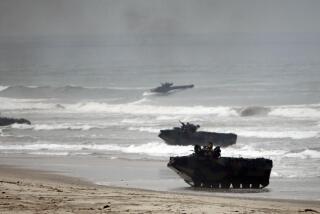Army Pfc. Keith J. Moore, 28, San Francisco; dies of noncombat injury
- Share via
As a chaplain at the Veterans Affairs hospital south of San Francisco, Susan Turley has faced the most intimate consequences of the Iraq war. She also has developed a deep admiration of military culture and purpose.
So when her only child revealed earlier this year he had enlisted in the Army, Turley reacted with fear and respect. Until well past 2 a.m., mother and son sat together, talking it out.
“He explained his whole journey -- the process that led to his decision,” said Turley, now among the grieving. “It was a turning point, where he became an adult friend of mine as well as my son.”
On Oct. 14, Army Pfc. Keith J. Moore, 28, also became San Francisco’s second Iraqi war casualty. His death, described by the Department of Defense only as the result of a “noncombat-related injury,” is under investigation. It could be months before his family learns the particulars.
Instead, they are left with his memory -- that of a young man with well-researched convictions who chose to serve his country.
Moore was a history buff who read voraciously about Vikings and ancient Greek military heroes, earning a respect for “the nobility of those that protect civilians.” He was a lover of music and an amateur guitar enthusiast with eclectic taste.
Moore was born in Newton, Mass., to Turley and Clifford J. Moore Jr., an attorney. The family bounced around -- to Portland, Maine; San Pedro; and outside Sacramento. It was there, in the El Dorado County town of Rescue, that Moore’s sixth-grade teacher pulled Turley aside: Keith was unusually gifted, she said, and really bored.
Seeking a more individualized academic environment, the family moved to San Francisco, where Keith enrolled in Woodside International School, a tiny private academy. He studied Latin, math and science. At 16, he graduated -- as a National Merit Scholar semifinalist.
“He had a pretty strong sense of what he thought was right or wrong,” said school founder John Edwards, who described Moore as a loyal friend with a “fairly poker-faced” brand of humor.
Moore briefly attended a college in Florida, then returned to San Francisco, where he took classes and always seemed to be volunteering to help friends move or build something.
Military service was discussed around the dinner table, as Turley, hired at the Palo Alto VA hospital in 2003, immersed herself in her work.
Moore had talked of joining the armed forces at age 17. Now, he spoke of learning to be a bomb detonator, of seeking corrective eye surgery to become a helicopter pilot. Although “not naive about the complexities of Iraq,” Turley said, her son spoke most passionately about wanting to serve Iraqi civilians by serving his country.
He completed basic and advanced training in Georgia and was assigned to the 2nd Battalion, 14th Infantry Regiment, 2nd Brigade Combat Team, 10th Mountain Division at Ft. Drum, N.Y.
Frustrated by what was to be a six-month wait for deployment to Iraq, he volunteered for a unit soon heading there.
Moore landed in August. He told his parents about heading out on eight-day patrols, and of a weapon that was rusty and in need of repairs. He died in Baghdad.
Late last month, a team of nearly 20 motorcyclists from the volunteer Patriot Guard Riders helped escort Moore’s casket from San Francisco International Airport, stopping traffic on Interstate 280. Then, they turned toward the ocean that Moore loved, crawling up the Great Highway at twilight as surfers and beachgoers stood at attention to pay respects.
He was buried at Golden Gate National Cemetery in San Bruno.
In addition to his parents, both of San Francisco, Moore is survived by his grandmothers, Peggy Moore of Richmond, Calif.; and Marilyn Turley of Olympia, Wash.
The uncertainty surrounding the cause of death “complicates the grieving process,” Turley said. “But the most important thing is my son served his country, and he’s a casualty of war.... He was a beautiful person. He died way too young.”



